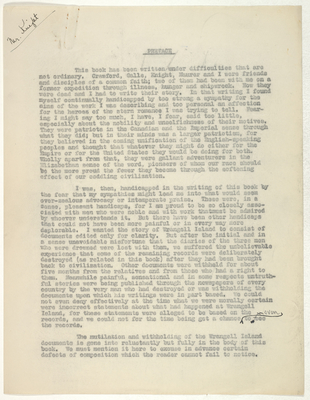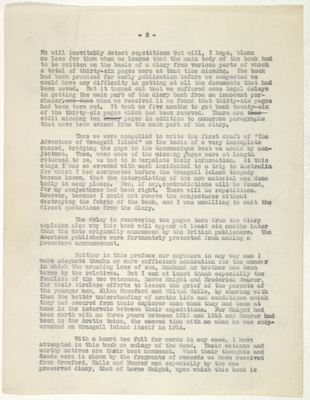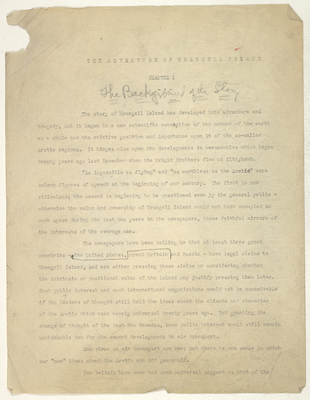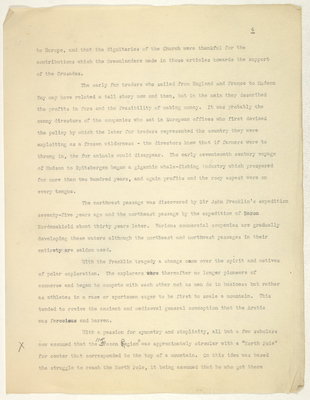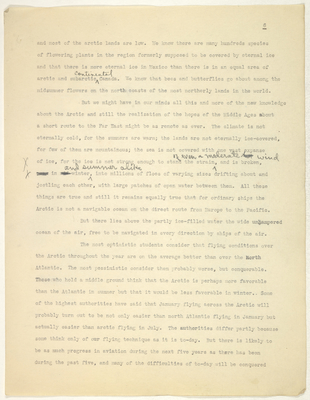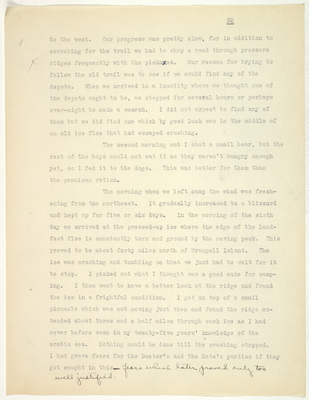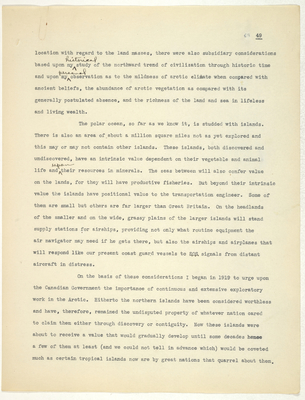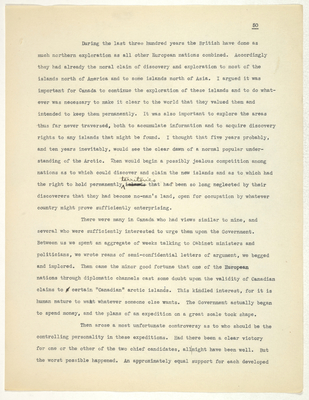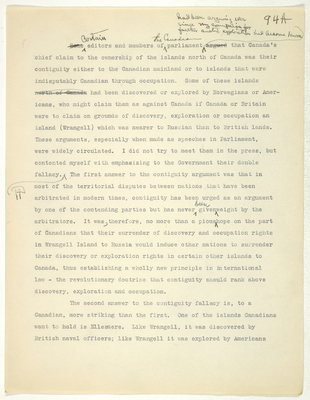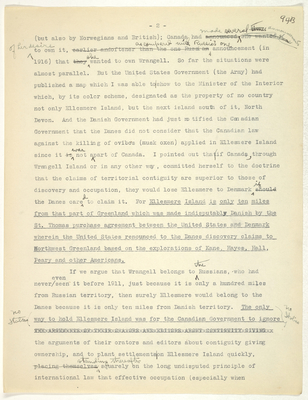Pages needing completion
No pages need transcription from scratch. These pages have been partially transcribed but need to be completed.
stefansson-wrangel-09-26-001
stefansson-wrangel-09-26-001-001
PREFACE
This book has been written under difficulties that are not ordinary. Crawford, Galle, Knight, Maurer and I were friends and disciples of a common faith; two of them had been with me on a former expedition through illness, hunger and shipwreck. Now they were dead and I had to write their story. in that writing I found myself continually handicapped by too strong a sympathy for the aims of the work I was describing and too personal an affection for the heroes of the stern romance I was trying to tell. Fearing I might say too much, I have, I fear, said too little, especially about the nobility and unselfishness of their motives. They were patriots in the Canadian and the Imperial sense through what they did; but in their minds was a larger patriotism, for they believed in the coming unification of the English-speaking peoples and throught that whatever they might do either for the Empire or for the United States they would be doing for both. Wholly apart from that, they were gallant adventurers in the Elizabethan sense of the word, pioneers of whom our race should be the more proud the fewer they become through the softening effect of our coddling civilization.
I was, then, handicapped in the writing of this book by the fear that my sympathies might lead me into what would seem over-zealous advocacy or intemperate praise. These were, in a sense, pleasant handicaps, for I am proud to be so closely associated with men who were noble and with work that must be admired by whoever understands it. But there have been other handicaps that could not have been more painful or in every way more deplorable. I wanted the story of Wrangell Island to consist of documents edited only for clarity. But after the initial and in a sense unavoidable misfortune that the diaries of the three men who were drowned were lost with them, we suffered the unbelievable experience that some of the remaining records were deliberately destroyed (as related in this book) after they had been brought back to civilization. Other documents were withheld for about five months from the relatives and from those who had a right to them. Meanwhile painful, sensational and in some respects untruthful stories were being published through the newspapers of every country by the very man who had destroyed or was withholding the documents upon which his writings were in part based. We could not even deny effectively at the time what we were morally certain were incorrect statements about what had happened at Wrangell Island, for these statements were alleged to be based on the records, and we could not for the time being get a chance even to see the records.
The mutilition and withholding of the Wrangell Island documents is gone into reluctantly but fully in the body of this book. We must mention it here to excuse in advance certain defects of composition which the reader cannot fail to notice.
stefansson-wrangel-09-26-001-002
- 2 -
He will inevitably detect repetitions but will, I hope, blame me less for them when he learns that the main body of the book had to be written on the basis of a diary from various parts of which a total of thirty-six pages were at that time missing. The book had been promised for early publication before we suspected we would have any difficulty in getting at all the documents that had been saved. But it turned out that we suffered some legal delays in getting the main part of the diary back from an innocent purchaser and that when we received it we found that thirty-six pages had been torn out. It took us five months to get back twenty-six of the thirty-six pages which had been removed. There are thus still missing ten diary pages in addition to numerous paragraphs that have been erased from the main part of the diary.
Thus we were compelled to write the first draft of "The Adventure of Wrangell Island" on the basis of a very incomplete record, bridging the gaps in the documents as best we could by conjecture. Then, when some of the missing pages were at length returned to us, we had to interpolate their information. At this stage I was so crowded with work incidental to a trip to Australia for which I had contracted before the Wrangell Island tragedy became known, that the interpolating of the new material was done badly in many places. Few, if any, contradictions will be found, for my conjectures had been right. There will be repetitions, however, because I could not remove the conjectures without destroying the fabric of the book, and I was unwilling to omit the direct quotations from the diary.
The delay in recovering the pages torn from the diary explains also why this book will appear at least six months later than the date originally announced by the British publishers. The American publishers were fortunately protected from making a premature announcement.
Neither in this preface nor anywhere in any way can I make adequate thanks or show sufficient admiration for the manner in which the crushing loss of son, husband or brother has been borne by the relatives. But I can at least thank especially the families of the two veterans, Lorne Knight and Frecerick Maurer, for their tireless efforts ot lesson the grief of the parents of the younger men, Allan Crawford and Milton Galle, by sharing with them the better understading of arctic life and conditions which they had secured from their explorer sons when they had been at home in the intervals between their expeditions. For Knight had been north with me three years between 1915 and 1918 and Maurer had been in the Arctic twice, the second time with me when he was shipwrecked on Wrangell Island itself in 1914.
With a heart too full for words in any case, I have attempted in this book no eulogy of the dead. Their actions and worthy motives are their best monument. What their thoughts and deeds were is shown by the fragments of records we have received from Crawford, Galle and Maurer and especially by the one preserved diary, that of Lorne Knight, upon which this book is
stefansson-wrangel-09-26-001-005
THE ADVENTURE OF WRANGELL ISLAND
CHAPTER 1 The Background of the Story
The story of Wrangell Island has developed into adventure and tragedy, but it began in a new scientific conception of the nature of the earth as a whole and the relative position and importance upon it of the so-called Arctic regions. It hinges also upon the developments in aeronautics which began twenty years ago last December when the Wright Brothers flew at Kittyhawk.
"As impossible as flying" and "as worthless and the Arctic" were solemn figures of speech as the beginning of our century. The first is now ridiculous; the second is beginning to be questioned even by the general public - otherwise the value and ownership of Wrangell Island would not have occupied so much space during the last two years in the newspapers, those faithful mirrors of the interests of the average man.
The newspapers have been telling us that at least three great centuries - the United States, Great Britain and Russia - have legal claims to Wrangell Island, and are either pressing those claims or considering whether the intrinsic or positional value of the island may justify pressing them later. Such public interest and such international negotiations would not be conceivable if the leaders of thought still held the ideas about the climate and character of the Arctic which were nearly universal twenty years ago. But granting the change of thought of the last two decades, keen public interest would still remain unthinkable but for the recent developments in air transport.
Our views on air transport are new; but there is one sense in which our "new" ideas about the Arctic are 400 years old.
Few beliefs have ever had such universal support as that of the
stefansson-wrangel-09-26-001-008
4
to Europe, and that the dignitaries of the Church were thankful for the contributions which the Greenlanders made in those articles towards the support of the Crusades.
The early fur traders who sailed from England and France to Hudson Bay may have related a tall story now and then, but in the main they described the profits in furs and the feasibility of making money. It was probably the canny directors of the companies who sat in European offices who first devised the policy by which the later fur traders represented the country they were exploiting as a frozen wilderness - the directors knew that if farmers were to throng in, the fur animals would disappear. The early seventeenth century voyage of Hudson to Spitsbergen began a gigantic whale-fishing industry which prospered for more than two hundred years, and again profits and the rosy aspect were on every tongue.
The northwest passage was discovered by Sir John Franklin’s expedition seventy-five years ago and the northeast passage by the expedition of Baron Nordenskiold about thirty years later. Various commercial companies are gradually developing these waters although the northeast and northwest passages in their entirety are seldom used.
With the Franklin tragedy a change came over the spirit and motives of polar exploration. The explorers were thereafter no longer pioneers of commerce and began to compete with each other not as men do in business but rather as athletes in a race or sportsmen eager to be first to scale a mountain. This tended to revive the ancient and mediaeval general conception that the Arctic was ferocious and barren.
With a passion for symmetry and simplicity, all but a few scholars now assumed that the "Frozen Region" was approximately circular with a "North Pole" for center that corresponded to the top of a mountain. On this idea was based the struggle to reach the North Pole, it being assumed that he who got there
stefansson-wrangel-09-26-001-010
6
and most of the arctic lands are low. We know there are many hundreds species of flowering plants in the region formerly supposed to be covered by eternal ice and that there is more eternal ice in Mexico than there is in an equal area of arctic and subarctic continental Canada. We know that bees and butterflies go about among the midsummer flowers on the northe coasts of the most northerly lands in the world.
But we might have in our minds all this and more of the new knowledge about the Arctic and still the realization of the hopes of the Middle Ages about a short route to the Far East might be as remote as ever. The climate is not eternally cold, for the summers are warm; the lands are not eternally ice-covered, for few of them are mountainous; the sea is not covered with one vast expanse X of ice, for the ice is not strong enough to standl the strain of even moderate []wind, and is broken, X over in mid-winter and summer alike, into millions of floes of varying sizes drifting about and jostling each other, with large patches of open water between them. All these things are true and still it remains equally true that for ordinary ships the Arctic is not a navigable ocean on the direct route from Europe to the Pacific.
But there lies above the partly ice-filled water the wide unjhampered ocean of the air, free to be navigated in every direction by ships of the air.
The most optimistic students consider that flying conditions over the Arctic throughout the year are on the average better than over the north Atlantic. The most pessimistic consider them probably worse, but conquerable. Those who hold a middle ground think that the Arctic is perhaps more favorable than the Atlantic in summer but that it would be less favorable in winter.. Some of the highest authorities have said that January flying across the Arctic will probably turn out to be not only easier than north Atlantic flying in January but actually easier than arctic flying in July. The authorities differ partly because some think only of our flying technique as it is to-day. But there is likely to be as much progress in aviation during the next five years as there has been during the past five, and many of the difficulties of to-day will be conquered
stefansson-wrangel-09-26-001-047
32
to the west. Our progress was pretty slow, for in addition to searching for the trail we had to chop a road through pressure ridges frequently with the pickaxes. Our reason for trying to follow the old trail was to see if we could find any of the depots. When we arrived in a locality where we thought one of the depots ought to be, we stopped for several hours or perhaps over-night to make a search. I did not expect to find any of them but we did find one which by good luck was in the middle of an old ice floe that had escaped crushing.
The second morning out I shot a small bear, but the rest of the boys would not eat it as they weren't hungry enough yet, so I fed it to the dogs. This was better for them than the pemmican ration.
The morning when we left camp the wind was freshening from the northeast. It gradually increased to a blizzard and kept up for five or six days. In the morning of the sixth day we arrived at the pressed-up ice where the edge of the landfast floe is constantly torn and ground by the moving pack. This proved to he about forty miles north of Wrangell Island. The ice was crushing and tumbling so that we just had to wait for it to stop. I picked out what I thought was a good cake for camping. I then went to have a better look at the ridge and found the ice in a frightful condition. I got on top of a small pinnacle which was not moving just then and found the ridge extended about three and a half miles through such ice as I had never before seen in my twenty-five years' knowledge of the arctic sea. Nothing could he done till the crushing stopped. I had grave fears for the Doctor's and the Mate's parties if they got caught in this - fears which later [proved] only too well justified.
stefansson-wrangel-09-27
stefansson-wrangel-09-27-004
49
location with regard to the land masses, there were also subsidiary considerations based upon my historical study of the northward trend of civilization through historic time and upon my personal observation as to the mildness of arctic climate when compared with ancient beliefs, the abundance of arctic vegetation as compared with its generally postulated absence, and the richness of the land and sea in lifeless and living wealth.
The polar ocean, so far as we know it, is studded with islands. There is also an area of about a million square miles not as yet explored and this may or may not contain other islands. These islands, both discovered and undiscovered, have an intrinsic value dependent on their vegetable and animal life and upon their resources in minerals. The seas between will also confer value on the lands, for they will have productive fisheries. But beyond their intrinsic value the islands have positional value to the transportation engineer. Some of them are small but others are far larger than Great Britain. On the headlands of the smaller and on the wide, grassy plains of the larger islands will stand supply stations for airships, providing not only what routine equipment the air navigator may need if he gets there, but also the airships and airplanes that will respond like our present coast guard vessels to SOS signals from distant aircraft in distress.
On the basis of these considerations I began in 1919 to urge upon the Canadian Government the importance of continuous and extensive exploratory work in the Arctic. Hitherto the northern islands have been considered worthless and have, therefore, remained the undisputed property of whatever nation cared to claim them either through discovery or contiguity. Now these islands were about to receive a value that would gradually develop until some decades hence a few of them at least (and we could not tell in advance which) would be coveted much as certain tropical islands now are by great nations that quarrel about them.
stefansson-wrangel-09-27-005
50
During the last three hundred years the British have done as much northern exploration as all other European nations combined. Accordingly they had already the moral claim of discovery and exploration to most of the islands north of America and to some islands north of Asia. I argued it was important for Canada to continue the exploration of these islands and to do whatever was necessary to make it clear to the world that they valued them and intended to keep them permanently. It was also important to explore the areas thus far never traversed, both to accumulate information and to acquire discovery rights to any islands that might be found. I thought that five years probably, and ten years inevitably, would see the clear dawn of a normal popular understanding of the Arctic. Then would begin a possibly jealous competition among nations as to which could discover and claim the new islands and as to which had the right to hold permanently territoriesislands that had been so long neglected by their discoverers that they had become no-man's land, open for occupation by whatever country might prove sufficiently enterprising.
There were many in Canada who had views similar to mine, and several who were sufficiently interested to urge them upon the Government. Between us we spent an aggregate of weeks talking to Cabinet ministers and politicians, we wrote reams of semi-confidential letters of argument, we begged and implored. Then came the minor good fortune that one of the European nations through diplomatic channels cast some doubt upon the validity of Canadian claims to a certain "Canadian" arctic islands. This kindled interest, for it is human nature to want whatever someone else wants. The Government actually began to spend money, and the plans of an expedition on a great scale took shape.
Then arose a most unfortunate controversy as to who should be the controlling personality in these expeditions. Had there been a clear victory for one or the other of the two chief candidates, all might have been well. But the worst possible happened. An approximately equal support for each developed
stefansson-wrangel-09-27-057
94A
Some Certain editors and membres of the Canadian parliament had been arguing ever since my compaign for further artic exploration had become knewer argued that Canada's chief claim to the ownership of the islands north of Canada was their contiguity either to the Canadian mainland or to islands that were indisputably Canadian through occupation. Some of these islands north of Canada had been discovered or explored by Norwegians or Americans, who might claim them as against Canada if Canada or Britain were to claim on grounds of discovery, exploration or occupation an island (Wrangell) which was nearer to Russian than to British lands. These arguments, especially when made as speeches in Parliament, were widely circulated. I did not try to meet them in the press, but contented myself with emphasizing to the Government their double fallacy.
The first answer to the contiguity argument was that in most of the territorial disputes between nations that have been arbitrated in modern times, contiguity has been urged as an argument by one of the contending parties but has never been given weight by the arbitrators. It was, therefore, no more than a pious hope on the part of Canadians that their surrender of discovery and occupation rights in Wrangell Island to Russia would induce other nations to surrender their discovery or exploration rights in certain other islands to Canada, thus establishing a wholly new principle in in ternational law - the revolutionary doctrine that contiguity should rank above discovery, exploration and occupation.
The second answer to the contiguity fallacy is, to a Canadian, more striking than the first. One of the islands Canadians want to hold is Ellesmere. Like Wrangell, it was discovered by British naval officers; like Wrangell it was explored by Americans
stefansson-wrangel-09-27-058
- 2 - 94B
(but also by Norwegians and British); Canada-, had announced made several announcements she wanted that her desire to own it, earlier andofterner than the one Russian as compared with Russia's one announcement (in 1916) that they she wanted to own Wrangell. So far the situations were almost parallel. But the United States Government (the Army) had published a map which I was able to show to the Minister of the Interior which, by its color scheme, designated as the property of no country not only Ellesmere Island, but the next island souih of it, North Devon. And the Danish Government had just no tified the Caiadian Government that the Danes did not consider that the Canadian law against the killing of ovibos (musk oxen) applied in Ellesmere Island since it is was not a part of Canada. I pointed out that if Canada, through Wrangell Island or in any other way , committed herself to the doctrine that the claims of territorial contiguity are superior to those of discovery and occupation, they would lose Ellesmere to Denmark if should the Danes care to claim it. For Ellesmere Island is only ten miles from that part of Greenland which was made indisputably Danish by the St. Thomas purchase agreement between the United States and Denmark wherein the United States renounced to the Danes discovery claims to Northwest Greenland based on the explorations of Kane, Hayes, Hall, Peary and other Americans.
If we argue that Wrangell belongs to the Russians, who had even A
never even seen it before 1911, just because it is only a hundred miles from Russian territory, then surely Ellesmere would belong to the Danes because it is only ten miles from Danish territory. The only way to hold Ellesmere Island was for the Canadian Government to ignore no Stolies THE ARGUMENTS OF THEIR ORATORS AND EDITORS ABOUT CONTIGUITY GIVING the arguments of their orators and editors about contiguity giving ownership, and to plant settlements on Ellesmere Island quickly, placing themselves standing thereafter squarely on the long undisputed principle of international law that effective occupation (especially when
